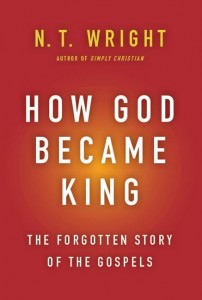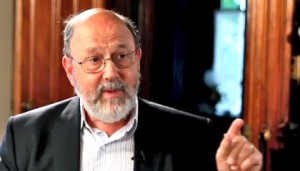N.T. Wright & How God Became King

Followers of Beyond the Pale know that the theme of the Kingdom of God has been resonating in my heart this last year. In fact its probably the driving force behind my re-launching the blog with a priority focus on faith and Kingdom issues. Since I’ve been sharing thoughts on “Kingdom” a couple friends have commented to me, “You must be reading N.T. Wright”
The fact is I hadn’t read any N.T. Wright but now that I have, I know why they thought I had. He articulates an understanding of the Kingdom of God in a way that is not very clearly promoted by much of the church today.
In his latest book, How God became King Wright proposes that the ancient creeds that govern the average church mission statement are…incomplete. Both the Apostolic as well as the Nicene creeds are similar in their silence about anything to do between Christ “being born of a virgin” to “suffering under Pontius Pilate.”
Wright then goes on to state that whenever we share the “gospel” with people we tend to skip over Matthew, Mark, Luke, and John and head straight to Paul in order to explain the “gospel”.
We don’t actually use the “gospels” much to share the “gospel”.
N. T. Wright, being a member of the Church of England and former Bishop of Durham, has a great regard for the traditional creeds and he goes into a bit of history on how they developed and why they make the declarations of faith that they do.
As mentioned though, he ultimately views the Creeds as book ends (Jesus born, then jumping to to his suffering and death) and as being incomplete. What Wright argues is what goes on in between, what fills the space that the creeds neglect, is the story of how the God of Israel became King over the whole world.
Says Wright:
The great creeds, when they refer to Jesus, pass directly from his virgin birth to his suffering death. The four gospels don’t….Matthew, Mar, Luke, and John all seem to think it’s hugely important that they tell us a great deal about what Jesus did between the time of his birth and the time of his death.
In particular, they tell us about what we might call his kingdom-inaugurating work; the deeds and words that declared that God’s Kingdom was coming then and there, in some sense or other, on earth as in heaven. They tell us a great deal about that and the creeds don’t.
Wright then goes on to use a metaphor of sitting in a square room with audio speakers in each of the four corners. Each one of them is sharing a different, yet very vital, aspect of the gospel story. He breaks down and explains what is being transmitted out of each of the four speakers:
1) The Gospels are an organic fulfillment of the story of Israel
2) The story of Jesus is the story of Yahweh visiting his people, and this means that his deity is assumed
3) Jesus comes to launch God’s renewed people into the kingdom or into kingdom life. This is what eternal life is all about
4) The kingdom of God conflicts with the kingdom of this world, because it subverts the expectations of worldly kingdoms.
Depending on your Christian faith tradition and church background the book suggests that you may have some speakers turned up too high (causing distortion), some speakers too low, or in some cases, have a speaker turned off altogether. In How God Became King Wright attempts to become the sound mixer and bring balance to each of these narratives.

N.T. Wright’s latest book fills the gap in a lot of traditional evangelical theology. When the gospels are seen as a “whole” and not simply reduced to it’s separate “sermon point” parts in support of random topics you really do begin to see that God was revealing something much, much bigger.
I think much of the church is only beginning to get the enormity of what Christ accomplished between his birth and his death.
Jesus effectively created an alternative society and now He is inviting people to become citizens of that life giving society or, put a better way, The God of Israel has become King of the world and he calls all men and women to be part of that Kingdom.
For me, I am hugely excited about what that entails. I have become much more “evangelistic” when that became the message I was sharing.
Pastor Brian Zahnd calls N.T. Wright “the C.S. Lewis of our generation” So, I would really recommend giving How God became King a read soon!
3 comments
Comments are closed.
Related
-
Coast to Coast Hike / Great Britain / Guy Stuff / Hiking / Steve's Life
Walking Across England: Our Upcoming Adventure!
By Steve -
China / Great Britain / Hong Kong / Politics
Return of the Gweilo
By Steve -
Great Britain / Hiking / Hong Kong / Steve's Life
Hiking in Hong Kong: Mui Wo to Discovery Bay
By Steve -
God's Kingdom / Space Program
Apollo 8 Reminds Us that God Says the Earth is Good!
By Steve -
Books / Christianity
Book Review: Rob Bell and a New American Christianity
By Steve -
Books / In Memorium
Goodbye to my friend Jackie
By Steve -
Coast to Coast Hike / Great Britain
Coast to Coast Walk Redux
By Steve -
Books / Grace of God / In Memorium
Brennan Manning: The Passing of the “Grandfather” of Grace
By Steve -
Coast to Coast Hike / Great Britain / Hiking / Hong Kong / Steve's Life
Coast to Coast Trip: We’re Off!!
By Steve -
Books / Christianity / God's Kingdom
Book Review: Things Unseen by Mark Buchanan
By Steve

I’m surprised this is your first NT Wright book, but he’s wonderful! This is one I haven’t gotten to yet…
Yeah, actually Logan you are one of the guys who a few months back asked me if I was reading N.T. Wright. Wonderful book…
I cant recommend N T Wright enough! I have just about ploughed through his magnum opus ‘Paul and the faithfulness of God’. Great if exhausting read. His main thesis is that Paul was defining 3 things: monotheism, election and eschatology. Picking out the election bit this definitely challenges Luther’s treatment. Luther saw Paul as redefining how we get saved: ‘not by works but by faith’ . This tends to set works in antithesis to faith. Wright argues that Paul was redefining who the people of God are. Paul main focus was the community and not the individual. Who rather than how. The how is there but always in the context of the who. The people of God are those who believe in a faithful Messiah. They are God’s new covenant people by faith. This is an important message for a me oriented world. It is a relief to discover that it is not all about me.